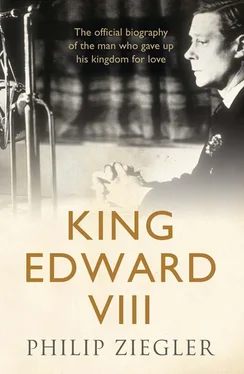3
‘Oh!! That I Had a Job’
THAT IN 1914 THE YOUTH OF BRITAIN WENT EXULTANTLY to war is one of the stranger features of that agonizing conflict. The Prince of Wales had even less reason than most to share in this exultation. For one thing, many of his close relations, whom he had grown to know and like over the past few years, were now numbered among the enemy. For another, his position as heir to the throne set him apart from his contemporaries: they set off with armour shining to defeat the Huns and be home by Christmas, he knew that his armour was likely to be more ornamental than useful and that he had only a slim chance of wearing it in battle. Yet when he heard that he was to join the Army in France, he wrote to Sir George Arthur of this ‘wonderful and joyous surprise’. Twenty-five years later he was shown this letter and commented how terrifying he found it, coming as it did from an average boy of twenty. He had conceived war almost as a holiday, ‘a glorious adventure’. ‘How disillusioned we all were at the end of it,’ he commented ruefully. ‘One wonders if the generation of that age today feel as we did, or are they conscious of the appalling consequences of another World war and its futility? No! far worse than that how it would utterly destroy civilization.’ 1
The run-up to war found the Prince incredulous and baffled. The murder of the Archduke Franz Ferdinand at Sarajevo embroiled first Austria and Serbia, then Germany and Russia, finally France and Britain. The Prince was inclined to believe that Russia and Germany were behaving reasonably and that Austria was the prime offender, but admitted, ‘I must stop talking all this rot, for I know nothing about it.’ 2As war between France and Germany became inevitable, his chief fear was lest the government should stay neutral. ‘That will be the end of us; we shall never be trusted by any power again.’ 3The decision to stand by our allies came as a great relief but ‘Oh!! God; the whole thing is too big to comprehend!! Oh!! That I had a job.’ 4That last expostulation was to be his constant refrain for the next four years. He went on to the balcony with his parents at Buckingham Palace to acknowledge the cheers of the crowd. The King wrote in his diary that night that he prayed to God he would protect dear Bertie’s life. 5It never occurred to him that his eldest son might be exposed to danger. How could he be? He was the Prince of Wales.
The Prince poured out his woes to his closest confidant, his brother Bertie:
Well, this is just about the mightiest calamity that has ever or will ever befall mankind … To think that but 17 days ago we were together with everything working peacefully in Europe, and now we are at the commencement of a most hideous and appalling war, the duration or issue of which are impossible to predict … ‘England at war with Germany!!’ that seems a sentence which would appear nowhere but in a mad novel.
The Germans could never have chosen a worse moment, and serve them right too if they are absolutely crushed, as I can but think they will be. The way they have behaved will go down to history as about the worst and most infamous action of any govt!! Don’t you agree? I bet you do.
I am as good as heartbroken to think I am totally devoid of any job whatsoever and have not the faintest chance of being able to serve my country. I have to stay at home with the women and children, a passenger of the worst description!! Here I am in this bloody gt palace, doing absolutely nothing but attend meals … Surely a man of 20 has higher things to hope for? But I haven’t apparently! Oh God it is becoming unbearable to live this usual life of ease and comfort at home, when you my dear old boy, and all naval and army officers, are toiling under unpleasant conditions, suffering hardships and running gt risks with your lives, for the defence and honour of England … At such a time you will picture me here, depressed and miserable and taking no more part in this huge undertaking than Harry and George, 2 irresponsible kids who run about playing inane games in the passage. However, enough about my rotten self, for I am a most bum specimen of humanity, and so must not be considered. 6
The self-disparagement in the last sentence is a constant feature of his letters and his diary; consciously overstated, yet nonetheless sincere. He knew that it was not his fault that he was not among the first of the volunteers to fight for King and country, but he still condemned himself for being left behind. In fact his period of misery hanging around ‘this awful palace where I have had the worst weeks of my life’ 7was quickly over. On 6 August 1914, only the day after he had written in such anguish to his brother, he asked for and was given a commission in the Grenadier Guards. He was only 5 feet 7 inches tall instead of the regulation 6 feet, but recorded in triumph: ‘I am to go to the King’s Company but shall be treated just like an ordinary officer, thank goodness, and am to share a room in barracks.’ 8In fact his treatment for the first fortnight was far worse than the ordinary officer, let alone the ordinary Guards officer, would have expected while serving at home. The 1st Battalion was training at Warley Barracks in Brentwood. The officers’ mess was a ‘filthy hole’, the rooms were garrets, there was no furniture and no carpet. ‘But what does one care when living under war conditions? I am so glad to have joined up and to have escaped from the palace!!’ 9
When the battalion moved back to London his euphoric mood persisted. He established that he was the first Prince of Wales ever to carry the colours on the King’s Guard at Buckingham Palace, and accepted with relish what in peacetime he would have dismissed as a piece of pompous ritual, as well as positively welcoming the long, boring route marches from Wellington Barracks through Kensington and Fulham returning down the King’s Road. ‘It is pretty rotten in London,’ he told Godfrey Thomas, ‘and we can’t do any training. But anyhow we are on the spot and feel that this is a stepping stone to getting out!! How we long for it.’ 10He deluded himself that he would continue to be treated ‘just like an ordinary officer’ and would soon go to France and the front with his fellow officers. His delusion was quickly dispelled. On 8 September, a week before the 1st Battalion sailed, his father told him that he would not accompany it. Instead he would join the 3rd Battalion and remain in London. ‘This is a bitter disappointment,’ he wrote in his diary. 11When the time came for him to watch the battalion march off from the barracks, his bitterness was still greater. ‘I am a broken man,’ he told his friend Jack Lawrence. ‘It is terrible being left behind!!’ 12
His closest friend in the Grenadiers, Lord Desmond Fitzgerald – one of the very few contemporaries who was invited to call him ‘Eddie’ – wrote to console him and tell him how much he had admired ‘the way you have borne your disappointment … However, it is not the fact of going to war, when thousands are doing so, that needs bravery; but to cheerfully accept the unpleasant things of life needs the greatest strength of character. And thus you have been able to set a wonderful example of how to do one’s duty.’ 13The Prince was unconvinced. In public he put a good face on it, but his misery was too acute to conceal from his friends. Indeed, he was anxious to advertise it; he would have been less than human if he had not wanted everyone to know that he was eager to share the dangers of war and stayed behind against his will. How real those dangers were became rapidly apparent; by 2 November only six officers of his beloved 1st Battalion remained unwounded.
He appealed to the Secretary of State for War, Lord Kitchener, and called on him with his father’s assistant private secretary, Clive Wigram. ‘He is now a gt fat bloated man,’ he wrote vengefully in his diary, who put forward what seemed to the Prince most unconvincing reasons for refusing him leave to return to the 1st Battalion, but held out vague hopes of his joining the staff of the Commander-in-Chief of the British Expeditionary Force, Sir John French, in a few months when the line had been stabilized. ‘A pretty rotten contrast to my gt wish,’ commented the Prince, adding grudgingly: ‘He is a rough customer but mighty strong, and is just the man to boss these politicians at such a time!!’ 14The King told Esher that his son had argued that he was expendable; if he were killed there were four brothers to take his place. ‘What if you were not killed, but taken prisoner?’ Kitchener asked drily. 15
Читать дальше












